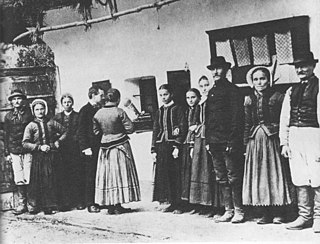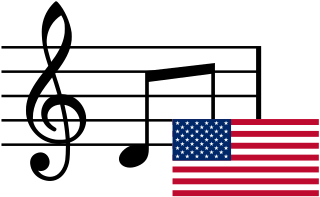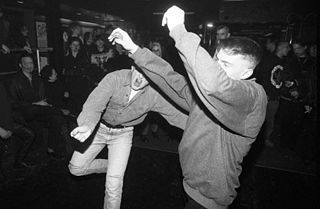Country is a genre of popular music that originated with blues, church music such as Southern gospel and spirituals, old-time, and American folk music forms including Appalachian, Cajun, Creole, and the cowboy Western music styles of New Mexico, Red Dirt, Tejano, and Texas country. Its popularized roots originate in the Southern and Southwestern United States of the early 1920s.

Folk music is a music genre that includes traditional folk music and the contemporary genre that evolved from the former during the 20th-century folk revival. Some types of folk music may be called world music. Traditional folk music has been defined in several ways: as music transmitted orally, music with unknown composers, music that is played on traditional instruments, music about cultural or national identity, music that changes between generations, music associated with a people's folklore, or music performed by custom over a long period of time. It has been contrasted with commercial and classical styles. The term originated in the 19th century, but folk music extends beyond that.
Indie rock is a genre of rock music that originated in the United States and United Kingdom in the 1970s. Originally used to describe independent record labels, the term became associated with the music they produced and was initially used interchangeably with alternative rock or "guitar pop rock". In the 1980s, the use of the term "indie" started to shift from its reference to recording companies to describe the style of music produced on punk and post-punk labels. During the 1990s, grunge and punk revival bands in the US and Britpop bands in the UK broke into the mainstream, and the term "alternative" lost its original counter-cultural meaning. The term "indie rock" became associated with the bands and genres that remained dedicated to their independent status. By the end of the 1990s, indie rock developed several subgenres and related styles, including lo-fi, noise pop, emo, slowcore, post-rock, and math rock. In the 2000s, changes in the music industry and a growing importance of the internet enabled a new wave of indie rock bands to achieve mainstream success, leading to questions about its meaningfulness as a term.

The music of the United States reflects the country's pluri-ethnic population through a diverse array of styles. It is a mixture of music influenced by the music of the United Kingdom, West Africa, Ireland, Latin America, and mainland Europe, among other places. The country's most internationally renowned genres are jazz, blues, country, bluegrass, rock, rock and roll, R&B, pop, hip hop, soul, funk, gospel, disco, house, techno, ragtime, doo-wop, folk music, americana, boogaloo, tejano, reggaeton, surf, and salsa. American music is heard around the world. Since the beginning of the 20th century, some forms of American popular music have gained a near global audience.
Alternative country, or alternative country rock is a loosely defined subgenre of country rock, which includes acts that differ significantly in style from mainstream country music, mainstream country rock, and country pop. Alternative country artists are often influenced by alternative rock. However, the term has been used to describe country music bands and artists that are also defined as or have incorporated influences from alternative rock, heartland rock, Southern rock, progressive country, outlaw country, neotraditional country, Texas country, Red Dirt, honky-tonk, bluegrass, rockabilly, psychobilly, roots rock, indie rock, hard rock, folk revival, indie folk, folk rock, folk punk, punk rock, cowpunk, and rhythm 'n' blues.

Rockabilly is one of the earliest styles of rock and roll music. It dates back to the early 1950s in the United States, especially the South. As a genre it blends the sound of Western musical styles such as country with that of rhythm and blues, leading to what is considered "classic" rock and roll. Some have also described it as a blend of bluegrass with rock and roll. The term "rockabilly" itself is a portmanteau of "rock" and "hillbilly", the latter a reference to the country music that contributed strongly to the style. Other important influences on rockabilly include western swing, boogie-woogie, jump blues, and electric blues.
A roots revival is a trend which includes young performers popularizing the traditional musical styles of their ancestors. Often, roots revivals include an addition of newly composed songs with socially and politically aware lyrics, as well as a general modernization of the folk sound.
Worldbeat is a music genre that blends pop music or rock music with world music or traditional music. Worldbeat is similar to other cross-pollination labels of contemporary and roots genres, and which suggest a rhythmic, harmonic or textural contrast between its modern and ethnic elements.
The music of Louisiana can be divided into three general regions: rural south Louisiana, home to Creole Zydeco and Old French, New Orleans, and north Louisiana. The region in and around Greater New Orleans has a unique musical heritage tied to Dixieland jazz, blues, and Afro-Caribbean rhythms. The music of the northern portion of the state starting at Baton Rouge and reaching Shreveport has similarities to that of the rest of the US South.

The term American folk music encompasses numerous music genres, variously known as traditional music, traditional folk music, contemporary folk music, or roots music. Many traditional songs have been sung within the same family or folk group for generations, and sometimes trace back to such origins as Great Britain, Mainland Europe, or Africa. Musician Mike Seeger once famously commented that the definition of American folk music is "...all the music that fits between the cracks."

Outlaw country is a subgenre of American country music created by a small group of iconoclastic artists active in the 1970s and early 1980s, known collectively as the outlaw movement, who fought for and won their creative freedom outside of the Nashville establishment that dictated the sound of country music of the era. Willie Nelson, Waylon Jennings, Kris Kristofferson, and David Allan Coe were among the movement's most commercially successful members.
Roots rock is rock music that looks back to rock's origins in folk, blues and country music. It is particularly associated with the creation of hybrid subgenres from the later 1960s including blues rock, country rock, Southern rock, and swamp rock which have been seen as responses to the perceived excesses of dominant psychedelic and developing progressive rock. Because roots music (Americana) is often used to mean folk and world musical forms, roots rock is sometimes used in a broad sense to describe any rock music that incorporates elements of this music. In the 1980s, roots rock enjoyed a revival in response to trends in punk rock, new wave and heavy metal music.
Western music is a form of country music composed by and about the people who settled and worked throughout the Western United States and Western Canada. Western music celebrates the lifestyle of the cowboy on the open ranges, Rocky Mountains, and prairies of Western North America. Directly related musically to old English, Irish, Scottish, and folk ballads, also the Mexican folk music of Northern Mexico and Southwestern United States influenced the development of this genre, particularly corrido, ranchera, New Mexico and Tejano. Western music shares similar roots with Appalachian music, which developed around the same time throughout Appalachia and the Appalachian Mountains. The music industry of the mid-20th century grouped the two genres together under the banner of country and western music, later amalgamated into the modern name, country music.

Dale Watson is an American country/Texas country singer, guitarist, songwriter, and self-published author based in Marshall, Texas. He champions "Ameripolitan" as a new genre of original music and has positioned himself as a tattooed, stubbornly independent outsider who is interested in recording authentic country music. As a result, he has become a favorite of critics and alt-country fans.
Americana is an amalgam of American music formed by the confluence of the shared and varied traditions that make up the musical ethos of the United States, specifically those sounds that are emerged from the Southern United States such as folk, gospel, blues, country, jazz, rhythm and blues, rock and roll, bluegrass, and other external influences. Americana, as defined by the Americana Music Association (AMA), is "contemporary music that incorporates elements of various American roots music styles, including country, roots-rock, folk, bluegrass, R&B and blues, resulting in a distinctive roots-oriented sound that lives in a world apart from the pure forms of the genres upon which it may draw. While acoustic instruments are often present and vital, Americana also often uses a full electric band."
This article describes trends in popular music in the 2010s. See also 2010s in the music industry.
This is a list of notable events in country music that took place in 2013.
Bro-country is a subgenre of mainstream country music originating in the 2010s, and is influenced by 21st-century hip hop, hard rock and electronica. Bro-country songs are often about attractive young girls, the consumption of alcohol, partying, and pickup trucks.
The Ameripolitan Music Awards, spearheaded by internationally acclaimed Texas Troubador, Dale Watson, were established as an annual celebration devoted to acknowledging and honoring the Ameripolitan music genre. Ameripolitan music is defined as original music with prominent roots influence, encompassing four subgenres of music that did not previously fit into any celebrated categories within the mainstream pop country music industry. The awards are funded predominantly by fan supported donations and include 16 different award categories, with special honorary awards also presented.

The Delta Bombers are an American rock'n'roll band that formed in Las Vegas, Nevada in 2008.






